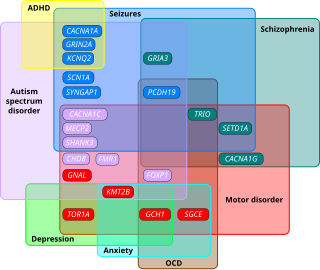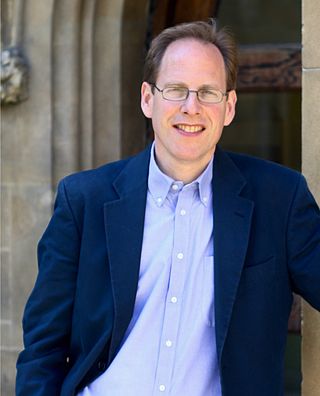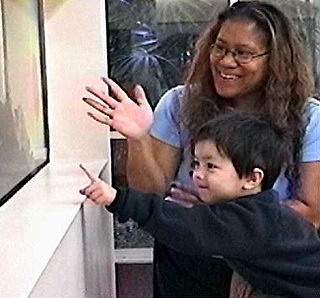Related Research Articles

Diagnoses of autism have become more frequent since the 1980s, which has led to various controversies about both the cause of autism and the nature of the diagnoses themselves. Whether autism has mainly a genetic or developmental cause, and the degree of coincidence between autism and intellectual disability, are all matters of current scientific controversy as well as inquiry. There is also more sociopolitical debate as to whether autism should be considered a disability on its own.

Autism spectrum disorders (ASD) are neurodevelopmental disorders that begin in early childhood, persist throughout adulthood, and affect three crucial areas of development: communication, social interaction and restricted patterns of behavior. There are many conditions comorbid to autism spectrum disorders such as attention-deficit hyperactivity disorder and epilepsy.

Sir Simon Philip Baron-Cohen is a British clinical psychologist and professor of developmental psychopathology at the University of Cambridge. He is the director of the university's Autism Research Centre and a Fellow of Trinity College.
The UC Davis MIND Institute is a research and treatment center affiliated with the University of California, Davis, with facilities located on the UC Davis Medical Center campus in Sacramento, California. The institute is a consortium of scientists, educators, physicians and parents dedicated to researching the causes of and treatments for autism spectrum disorders, fragile X syndrome, and other neurodevelopmental disorders. The director of the MIND institute is Dr. Leonard Abbeduto.
High-functioning autism (HFA) was historically an autism classification where a person exhibits no intellectual disability, but may experience difficulty in communication, emotion recognition, expression, and social interaction.
Mind-blindness, mindblindness or mind blindness is a theory initially proposed in 1990 that claims that all autistic people have a lack or developmental delay of theory of mind (ToM), meaning they are unable to attribute mental states to others. According to the theory, a lack of ToM is considered equivalent to a lack of both cognitive and affective empathy. In the context of the theory, mind-blindness implies being unable to predict behavior and attribute mental states including beliefs, desires, emotions, or intentions of other people. The mind-blindness theory asserts that children who delay in this development will often develop autism.

The heritability of autism is the proportion of differences in expression of autism that can be explained by genetic variation; if the heritability of a condition is high, then the condition is considered to be primarily genetic. Autism has a strong genetic basis. Although the genetics of autism are complex, autism spectrum disorder (ASD) is explained more by multigene effects than by rare mutations with large effects.

Many causes of autism, including environmental and genetic factors, have been recognized or proposed, but understanding of the theory of causation of autism is incomplete. Attempts have been made to incorporate the known genetic and environmental causes into a comprehensive causative framework. ASD is a neurodevelopmental disorder marked by impairments in communicative ability and social interaction, as well as restricted and repetitive behaviors, interests, or activities not suitable for the individual's developmental stage. The severity of symptoms and functional impairment vary between individuals.

Autism therapies include a wide variety of therapies that help people with autism, or their families. Such methods of therapy seek to aid autistic people in dealing with difficulties and increase their functional independence.
Mady Hornig is an American psychiatrist and an associate professor of epidemiology at Columbia University's Mailman School of Public Health. A physician-scientist, her research involves clinical, epidemiological, and animal model research on autism and related neurodevelopmental conditions. She directs the clinical core of an international investigation of the role of Borna disease virus in human mental illness and participates as a key investigator for the Autism Birth Cohort (ABC) project, a large prospective epidemiological study, based in Norway, that is identifying how genes and timing interact with environmental agents preceding the onset of autism spectrum diagnoses. In 2006, she was appointed as guest professor at the school of basic medical science of Beijing University in Beijing, China.

Classic autism, also known as childhood autism, autistic disorder, (early) infantile autism, infantile psychosis, Kanner's autism,Kanner's syndrome, or (formerly) just autism, is a neurodevelopmental condition first described by Leo Kanner in 1943. It is characterized by atypical and impaired development in social interaction and communication as well as restricted, repetitive behaviors, activities, and interests. These symptoms first appear in early childhood and persist throughout life.

Autism, formally called autism spectrum disorder (ASD) or autism spectrum condition (ASC), is a neurodevelopmental disorder marked by deficits in reciprocal social communication and the presence of restricted and repetitive patterns of behavior. Other common signs include difficulties with social interaction, verbal and nonverbal communication, along with perseverative interests, stereotypic body movements, rigid routines, and hyper- or hyporeactivity to sensory input. Autism is clinically regarded as a spectrum disorder, meaning that it can manifest very differently in each person. For example, some are nonspeaking, while others have proficient spoken language. Because of this, there is wide variation in the support needs of people across the autism spectrum.

The imprinted brain hypothesis is an unsubstantiated hypothesis in evolutionary psychology regarding the causes of autism spectrum and schizophrenia spectrum disorders, first presented by Bernard Crespi and Christopher Badcock in 2008. It claims that certain autistic and schizotypal traits are opposites, and that this implies the etiology of the two conditions must be at odds.
Vijendra Kumar Singh is a neuroimmunologist who formerly held a post at Utah State University, prior to which he was a professor at the University of Michigan. While affiliated with both institutions, he conducted some controversial autism-related research focusing on the potential role of immune system disorders in the etiology of autism. For example, he has testified before a US congressional committee that, in his view, "three quarters of autistic children suffer from an autoimmune disease."
The International Meeting for Autism Research, or IMFAR for short, is an annual meeting held each spring by the International Society for Autism Research. The 2019 meeting was held in Montreal. The 2015 meeting was in Salt Lake City. The 2014 meeting was held in Atlanta from May 14 to 17. In 2013, IMFAR was held in San Sebastian, Spain.
The development of an animal model of autism is one approach researchers use to study potential causes of autism. Given the complexity of autism and its etiology, researchers often focus only on single features of autism when using animal models.
The CHARGE study, which stands for Childhood Autism Risks from Genetics and the Environment, was launched in 2003 by researchers at the MIND Institute. It describes its goal as to research the role of gene-environment interactions in influencing autism risk. Scientists involved in the research include Irva Hertz-Picciotto, who is the study's principal investigator. The study is funded by the National Institutes of Health. Over 1,000 families have participated in the study. The children in the study are divided into three groups: children with autism, children with developmental delay, and children chosen at random from the general population.
Sex and gender differences in autism exist regarding prevalence, presentation, and diagnosis.
The mechanisms of autism are the molecular and cellular processes believed to cause or contribute to the symptoms of autism. Multiple processes are hypothesized to explain different autism spectrum features. These hypotheses include defects in synapse structure and function, reduced synaptic plasticity, disrupted neural circuit function, gut–brain axis dyshomeostasis, neuroinflammation, and altered brain structure or connectivity.
The pathophysiology of autism is the study of the physiological processes that cause or are otherwise associated with autism spectrum disorders.
References
- 1 2 3 "Paul Ashwood". MIND Institute . Retrieved 5 November 2013.
Dr. Ashwood's original research in his native England was the first to characterize gastrointestinal pathology observed in some cases of children with autism.
- 1 2 Name droppers: UCD’s Paul Ashwood receives Trailblazer Award Davis Enterprise
- ↑ "Paul Ashwood, Ph.D." UC Davis Website. Archived from the original on 10 December 2014. Retrieved 5 December 2014.
- ↑ Abha Chauhan; Ved Chauhan; Ted Brown (8 June 2010). Autism: Oxidative Stress, Inflammation, and Immune Abnormalities. Taylor & Francis. pp. 277–?. ISBN 978-1-4200-6887-0.
- ↑ "Children with autism have distinctly different immune system reactions compared to typical children". Eurekalert! (Press release). 5 May 2005. Retrieved 4 October 2013.
- ↑ Sample, Ian (6 May 2005). "Move towards autism test at birth raises fears". The Guardian . Retrieved 11 February 2014.
- ↑ Dietert, Rodney; Luebke, Robert (2012). Immunotoxicity, Immune Dysfunction, and Chronic Disease. Springer Science+Business Media. p. 253.
- ↑ Wachter, Kerri (1 February 2005). "Immune Dysregulation Linked To Autism Spectrum Disorders". Clinical Psychiatry News. Retrieved 5 October 2013.
- ↑ Braunschweig, D.; Ashwood, P.; Krakowiak, P.; Hertzpicciotto, I.; Hansen, R.; Croen, L.; Pessah, I.; Vandewater, J. (2007). "Autism: Maternally derived antibodies specific for fetal brain proteins". NeuroToxicology. 29 (2): 226–31. doi:10.1016/j.neuro.2007.10.010. PMC 2305723 . PMID 18078998.
- ↑ Cabanlit, M.; Wills, S.; Goines, P.; Ashwood, P.; Van De Water, J. (2007). "Brain-Specific Autoantibodies in the Plasma of Subjects with Autistic Spectrum Disorder". Annals of the New York Academy of Sciences. 1107 (1): 92–103. Bibcode:2007NYASA1107...92C. doi:10.1196/annals.1381.010. PMID 17804536. S2CID 6137245.
- ↑ Croen, L. A.; Braunschweig, D.; Haapanen, L.; Yoshida, C. K.; Fireman, B.; Grether, J. K.; Kharrazi, M.; Hansen, R. L.; Ashwood, P.; Van De Water, J. (2008). "Maternal Mid-Pregnancy Autoantibodies to Fetal Brain Protein: The Early Markers for Autism Study". Biological Psychiatry. 64 (7): 583–588. doi:10.1016/j.biopsych.2008.05.006. PMC 2574992 . PMID 18571628.
- ↑ Golden, Cory (10 July 2013). "Maternal antibodies linked to autism, UCD team finds". Davis Enterprise . Retrieved 17 December 2013.
- ↑ Ashwood, P.; Krakowiak, P.; Hertz-Picciotto, I.; Hansen, R.; Pessah, I.; Van De Water, J. (2011). "Elevated plasma cytokines in autism spectrum disorders provide evidence of immune dysfunction and are associated with impaired behavioral outcome". Brain, Behavior, and Immunity . 25 (1): 40–45. doi:10.1016/j.bbi.2010.08.003. PMC 2991432 . PMID 20705131.
- ↑ "MIND Institute recognized for Autism research". Sacramento Today. 27 December 2011. Retrieved 7 October 2013.
- ↑ Onore, C. E.; Nordahl, C. W.; Young, G. S.; Van De Water, J. A.; Rogers, S. J.; Ashwood, P. (2012). "Levels of Soluble Platelet Endothelial Cell Adhesion Molecule-1 and P-Selectin Are Decreased in Children with Autism Spectrum Disorder". Biological Psychiatry. 72 (12): 1020–1025. doi:10.1016/j.biopsych.2012.05.004. PMC 3496806 . PMID 22717029.
- ↑ "Ask the experts: amazing Who's Who of lawyers' recruits for vaccine attack". Briandeer.com. Retrieved 4 October 2013.